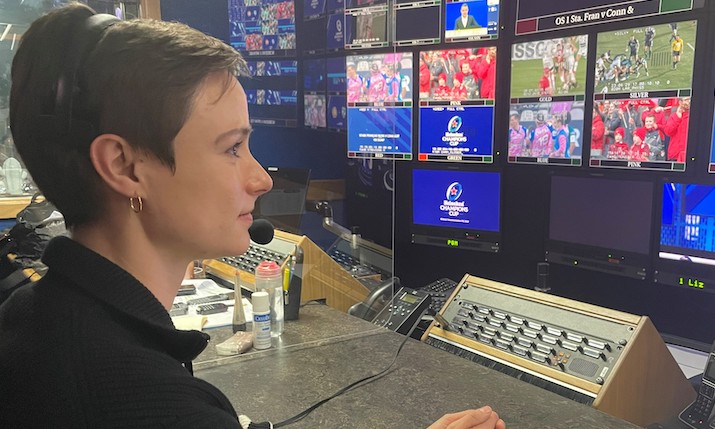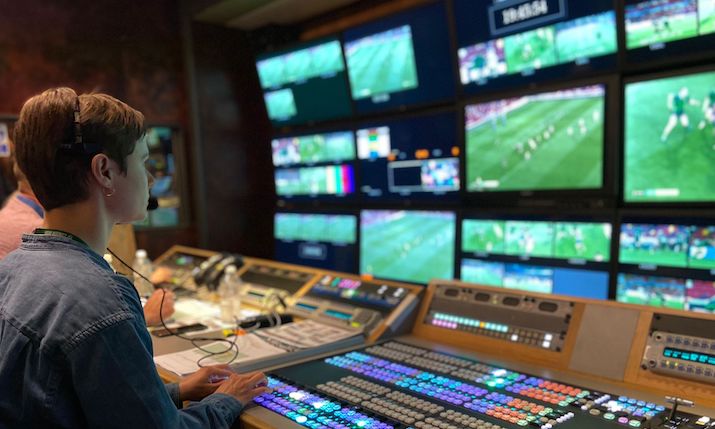Love of sport: Sunset+Vine’s Sarah Cox talks huge learning curves and seizing opportunities

Cox: ‘Hopefully 2023 brings lots of opportunities to grow and develop as a director’
By Sarah Cox, junior director, Sunset+Vine
For me, the love of sport came first; it’s always been a big part of my life. The idea of working in media came later; I was at uni when I first seriously considered it as a career option. From the start, I always knew that sport was the area I wanted to work in, and with a bit of luck and a lot of hard work, I’ve been able to make that happen.
On what I enjoy about this job, where do I start? I’ve always loved sport, and rugby in particular, so I feel very privileged to work on it full time. And there’s nothing like the buzz of working in live TV. It’s a very collaborative environment, which I really enjoy. Getting a programme to air is a huge team effort, and as a director, I love being right in the middle of it.
The roles I’ve worked in (analysis AP, VT coord and now director) have traditionally been very male dominated, particularly within live sport. I’ve never experienced any overt discrimination, but I would say there’s a greater burden on women to prove ourselves.
I would describe it like this: as a man, you’re assumed to be competent until you prove otherwise, whereas as a woman, the opposite is true. I think this is partly because people associate the roles I’ve worked in with certain traits – authority, decisiveness, control – that are stereotypically viewed as ‘male’ traits.
By contrast, women are stereotypically seen as less authoritative and more emotional, which can lead to a fear that we will crumble under pressure, and therefore a reticence to put us into positions of authority.
I definitely came across this attitude earlier in my career. Unfortunately, I don’t have a very satisfactory answer for how I got past this; I just kept working hard and trusted that eventually the quality of my work would speak for itself. I think the only way things will really change is when people get as used to seeing women in these roles as they are to seeing men. Hopefully I can be a small part of creating that change.
On the challenges of directing, it’s not exactly a sociable career! When I went into this industry I accepted that it would involve working the vast majority of weekends, but it can still be hard at times when you feel like you’re missing out. It’s also a very intense environment, and it can be draining, so burnout is a risk. It’s important to look after yourself so you can still give your all and enjoy it.
But it combines two of my favourite things: the enjoyment of watching sport, and the buzz of working in live TV. It’s a really collaborative environment, and I love the feeling of a whole crew of people working together to deliver a successful show.
Huge learning curve
Over the last two years my role has changed a lot. It’s almost exactly two years since I did my first ever directing shift on an overnight women’s cricket studio. Since then, it’s been one huge learning curve, and I’ve loved it! Hopefully 2023 brings lots of opportunities to grow and develop as a director, working on a range of different sports and different kinds of shows.
On cool stuff, Sunset+Vine’s partnership with Prime Video has produced some really interesting innovations, across both Premier League football and Autumn Nations Series rugby. For example, getting both managers into pre-match pres for Chelsea vs Brentford in December; this had never been done before, and really added to the coverage.
“As women, we’re often taught to downplay our own achievements, so try to get comfortable advocating for yourself and putting yourself forward for opportunities”
For me, the coolest thing I’ve worked on was directing the Final Qualifying Tournament for the Rugby World Cup in Dubai in November. It wasn’t the biggest spec or the most high-profile production I’ve worked on, but you could see just how much was at stake for the teams involved. In the end Portugal won the tournament to qualify for the Rugby World Cup for only the second time, and it was really special to be a part of telling that story.
To other women I’d say, treat everything as a learning opportunity, ask questions and think about where you can add value. Take pride in your work; even seemingly minor tasks can have a major impact on a production if they’re done well (and even more so if they’re not!)
As women, we’re often taught to downplay our own achievements, so try to get comfortable advocating for yourself and putting yourself forward for opportunities. And a very basic piece of advice – be nice to people! You’d be surprised how far it gets you!
Embracing new roles
I did a History degree, a classic choice for those who have no idea what they want to do with their lives! While at uni, as well as playing a lot of sport, I started working in student media and doing work experience with local papers and radio stations during the holidays. I then did an MA in Broadcast Journalism at City, University of London.
My first job was reading radio travel news bulletins. I worked for a company called INRIX, who I found out about via my MA course; they’re effectively an agency that supply travel news bulletins to lots of different radio stations. I was only there a few months, but it was a great introduction to the world of live broadcasting.

Cox: ‘I think the only way things will really change is when people get as used to seeing women in these roles as they are to seeing men. Hopefully I can be a small part of creating that change.’
I spent a year at Perform (now DAZN), scripting, voicing and editing sports news and highlights videos. I then moved to Sky, where I spent 18 months as a graphics operator working across a range of sports programmes, but increasingly specialising in rugby. I moved to Sunset+Vine in October 2015 as a junior AP in the BT Sport Rugby team, and I’ve been there ever since.
My role as junior director isn’t a role that’s traditionally existed within Sunset+Vine, so there was a bit of negotiation involved! Fortunately, I have a great boss who’s always supported my directing ambitions, and that’s meant I’ve been able to take advantage of the opportunities that have come along.
I’d known for some time that directing was the route I wanted to go down, so it was a case of working out what opportunities existed within Sunset+Vine for me to pursue that. Since then, it’s been a case of saying yes to pretty much everything and going with it.
As this is a new role for the company, there wasn’t really any formal training in place, so it’s very much been a case of learning on the job. As a director, you need a little bit of knowledge about every area of a production, and I’ve definitely still got plenty to learn on that front. Luckily I’m surrounded by far more experienced and knowledgeable people, so I mostly see my role as creating an environment that allows them to do their best work.
I find that directing remotely presents additional challenges, as you’re just not as connected to the event when you’re not there. There are lots of things that it’s harder to get a sense of – how long is the walk from the presentation position to commentary? What’s the weather like? Do we need to set up our wet weather position, or will we be OK pitchside with umbrellas? Are any of our match cameras likely to get blocked, and can we make adjustments to improve that? It’s also harder to build working relationships with people when you’re not there with them in person; there’s only so much you can get to know people over talkback!
